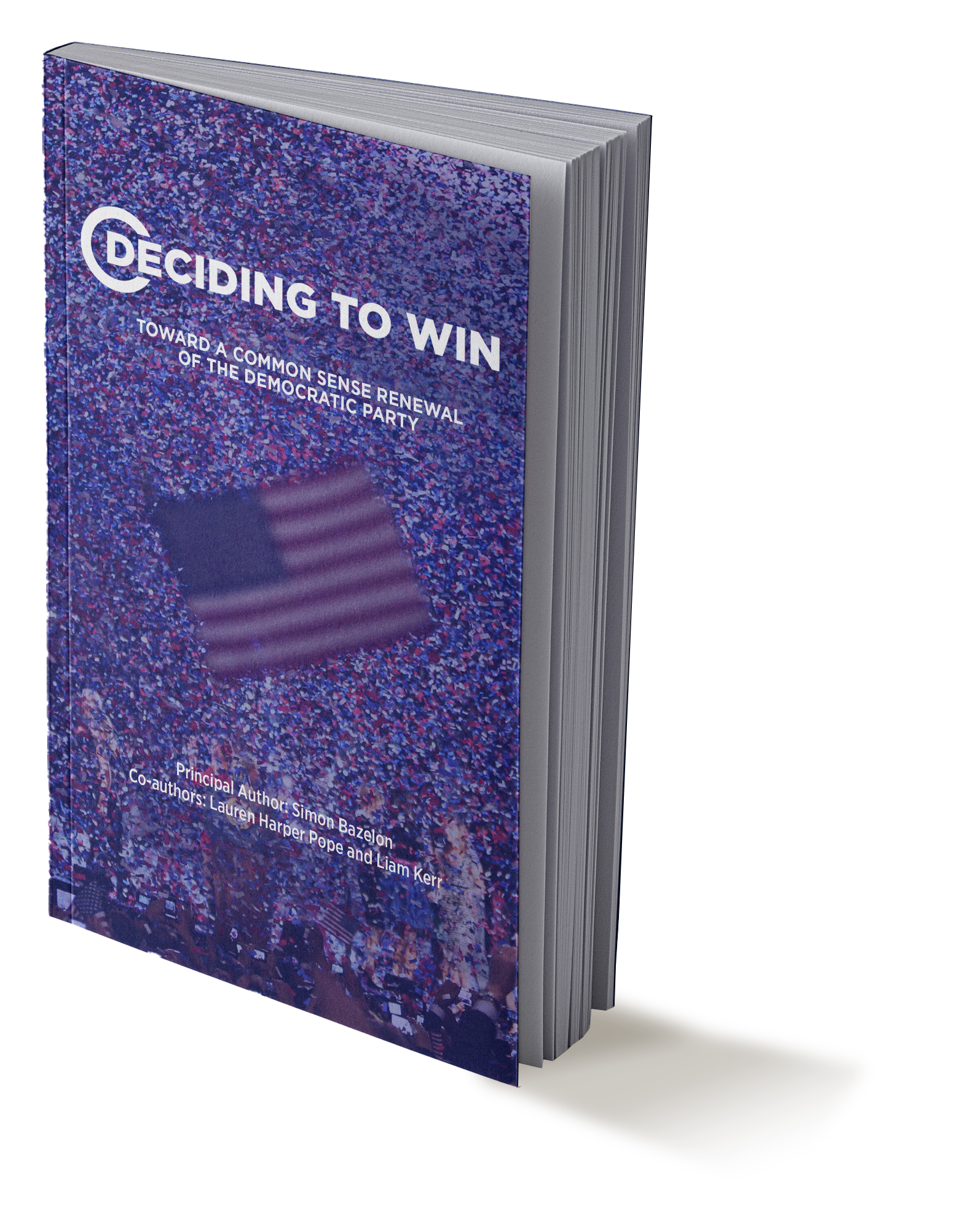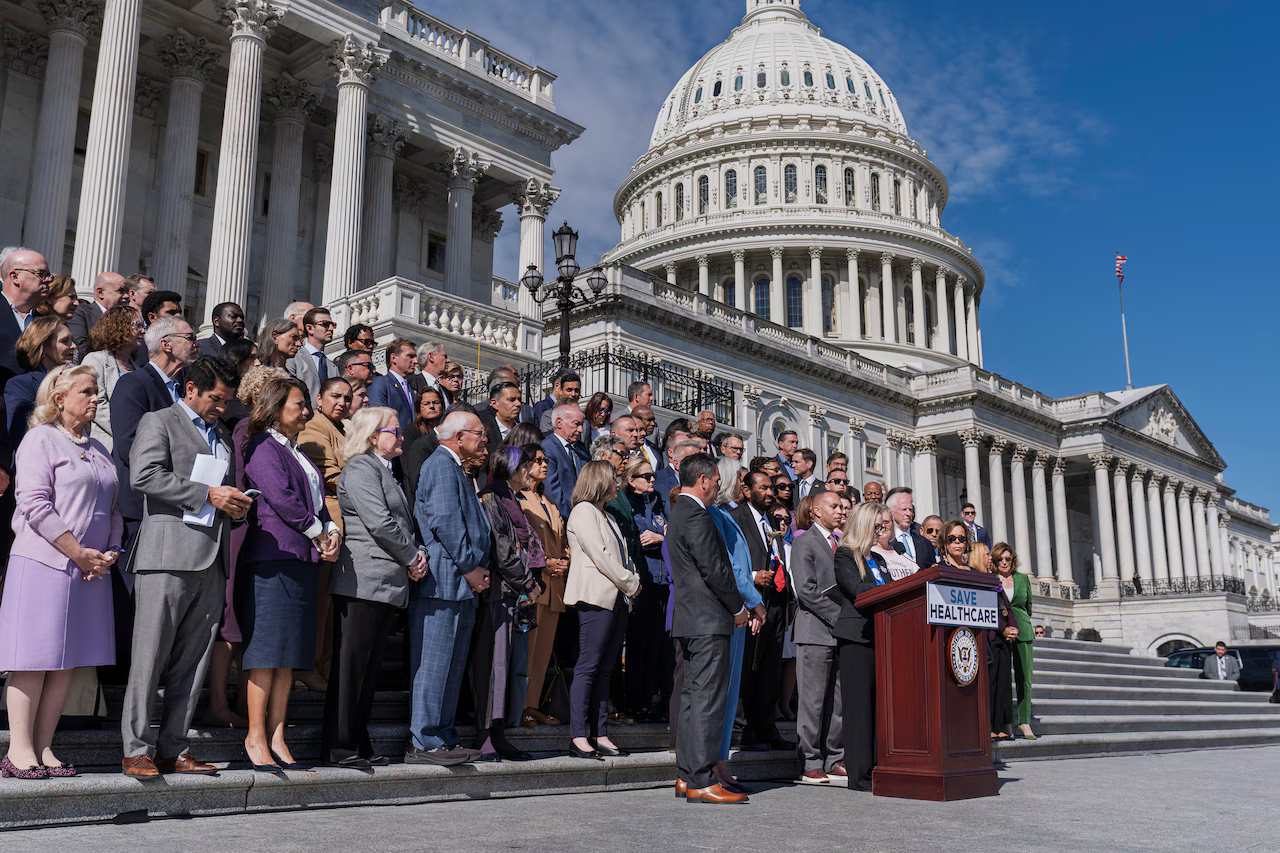
In order to take back Congress and the presidency, Democrats need to understand the political and strategic landscape we face. Deciding to Win aims to provide the most comprehensive account to date of why Democrats lost and what our party needs to do to win again.
We draw on thousands of election results, hundreds of public polls and academic papers, dozens of case studies, and surveys of more than 500,000 voters we conducted since the 2024 election. Deciding to Win argues that since 2012, highly-educated staffers, donors, advocacy groups, pundits, and elected officials have reshaped the Democratic Party’s agenda, decreasing our party’s focus on the economic issues that are the top concerns of the American people. These same forces have pushed our party to adopt unpopular positions on a number of issues that are important to voters, including immigration and public safety. To win again, Democrats need to listen more to voters and less to out-of-touch donors, detached party elites, and Democratic politicians who consistently underperform the top of the ticket.
About the Authors
-

Simon Bazelon
Research Fellow, Welcome
Before joining Welcome, Simon worked as a Research Analyst at Future Forward, Blue Rose Research, and Data for Progress, where he helped develop messaging guidance for Democratic candidates, PACs, and advocacy organizations.
-

Lauren Harper Pope
Co-Founder, Welcome
Before co-founding Welcome, Lauren served as SC State Director for Beto O’Rourke’s presidential campaign, as Policy and Communications Advisor for Columbia, SC Mayor Steve Benjamin, and as an aide to former SC State Sen. Mia McLeod.
-

Liam Kerr
Co-Founder, Welcome
Before co-founding Welcome, Liam served as Massachusetts State Director for Democrats for Education Reform, an advocacy group that supports Democratic candidates who are working to improve our nation’s public education system.
Order a hard copy of Deciding to Win
Praise for Deciding to Win
“Once upon a time, we just called the analysis in Deciding to Win "common sense." Somewhere along the way, that common sense stopped being so common, and Democrats started losing elections as a result. It's good to see someone bringing rigorous data to this conversation, to back up what our party used to know: That by focusing on economic issues and meeting voters where they are on immigration and public safety, Democrats can win commanding majorities.”
— James Carville, Campaign Manager, Clinton 1992
“We have a saying on my team: First you gotta win! If you don’t win, you don’t govern, you don’t lead, and you don’t have a seat at the table. It’s not about winning at ALL costs, but it’s certainly about winning. Period. In Deciding to Win, that’s the premise, and it’s spelled out in a way that the Democratic Party had better listen—for the good of our nation.”
— Cheri Bustos, former Democratic Congresswoman and DCCC Chair
“Deciding to Win marshals an impressive array of data to diagnose the Democratic Party's electoral challenges. This ambitious synthesis of polling data, academic research, and case studies offers an illuminating framework for understanding contemporary American political dynamics."
— Josh Kalla, Yale Political Science Professor of Political Science at Yale University
“To learn why elections are won and lost, we must move beyond unsupported conjecture and unfalsifiable assertions, and instead bring to bear the best evidence and highest-quality research we have. Deciding to Win does just that. I strongly recommend everyone read it."
— Jonathan Robinson, former Director of Research at Catalist
“Harry Reid believed in fighting the good fight to win, not just to make noise. Deciding to Win channels that spirit with hard truths and sharp insights about what Democrats must do to start winning again."
— Susan McCue, Former Chief of Staff to Senator Harry Reid and Co-Founder of Senate Majority PAC
When someone asks me how I was able to win as a Democrat in a district Trump carried by 19,000 votes, I point them to this groundbreaking report. I am a lifelong, proud Democrat, but I win my district by addressing the issues that matter most to my constituents: affordability, immigration, taxes, crime, and healthcare.
— Rep. Tom Suozzi, Democratic Congressman, NY-03
“Deciding to Win is a compelling, data-driven account of how to get the Democratic Party back on track with the American people and restore the trust Democrats have lost. At a time when the discussions over the party's future tend to devolve into unproductive finger pointing, this analysis offers a clear path back to a majority, rooted in common sense and backed by volumes of data."
— Lakshya Jain, Head of Political Data at The Argument and Co-Founder of Split Ticket
“Deciding to Win lays out what most Democrats outside of D.C. and coastal elite circles already know: Campaigning on unpopular policies and ignoring voters’ top priorities leads to disastrous electoral results. There is a different path, if Democrats decide to take it. ”
— Greg Schultz, Campaign Manager and Senior Advisor, Biden 2020
“Deciding to Win is an evidence-based, comprehensive examination of what Democrats must do to win more elections. It applauds leaders across the political spectrum and prescribes an approach to communicating with voters that allows us to both lean into our values and earn more support. We are seeing, in real time, that elections have major consequences. If Democrats want to advance our policy agenda in the future, we have to win elections first. Following the advice in this report is a critical first step.”
— Alixandria Lapp, Democratic Strategist and Founder of House Majority PAC
“You can’t save democracy by wishing away the contradictions of the actually-existing electorate. A must-read for anyone trying to grapple with the challenges of building political change in America today."
— Lara Putnam, Professor of History at the University of Pittsburgh
“If Democrats actually followed the guidance in Deciding to Win, it would make my job a lot harder. Luckily, they probably won’t.”
— Patrick Ruffini, Republican Pollster and Strategist
MEDIA
MEDIA
Left-wing ideas have wrecked Democrats’ brand, new report warns
SEMAFOR
Dave Weigel
“Deciding to Win” is a major addition to the library of Where Dems Went Wrong literature. Democrats are anticipating a decent off-year election for the party; it’s favored to win back the governor’s office in Virginia, hold the New Jersey governorship, and get California voters to wipe out five Republican-held congressional seats via referendum.
That would build on the Democratic optimism created by their special election wins and strong margins this year.
Centrist WelcomePAC charts path for Dems, with help from Axelrod, Plouffe and others
POLITICO
Lisa Kashinsky
Centrist Democrats have a plan for their party to win again: Talk more about the economy and less about democracy. Reject corporate interests and ideological purity tests. Keep the progressive policies that are popular — like expanding health care and raising the minimum wage — and moderate on issues like immigration and crime.
Those are among the takeaways laid out in an expansive report Monday from WelcomePAC, which supports center-left candidates, on how Democrats can rebound from last year’s electoral wipeout in 2026 and 2028.
The lengthy report, released Monday and titled “Deciding to Win,” reveals that Democrats have lost ground with most voters outside of self-described “white liberals” in their shift to increasingly left-leaning rhetoric and ideas since 2012. According to the report, which was created by center-left group Welcome and first reported by Semafor, around 70% of voters believe the Democratic Party is “out of touch,” while the party received negative marks across all categories on sufficiently prioritizing issues related to the economy, border security and reducing crime.
Top Democrats hit with brutal wake-up call on quest to take on Trump: ‘Better listen’
NJ.COM
Rachel Cohen
In Bazelon’s telling, a new message is the only thing that matters—and Democrats can only start winning again if they refocus on popular middle-class economic issues while distancing themselves from politically toxic positions on crime, immigration, and education. “Everyone is searching for a theory of the case or an explanation that doesn’t pin any responsibility for our defeat on the unpopularity of various Democratic positions,” Bazelon told me. “What we need to do to win is very simple: We need to advocate for positions voters agree with, and focus on the issues they care about most.”
The Dems’ Flight 93 Essay
Puck News
Peter Hamby







